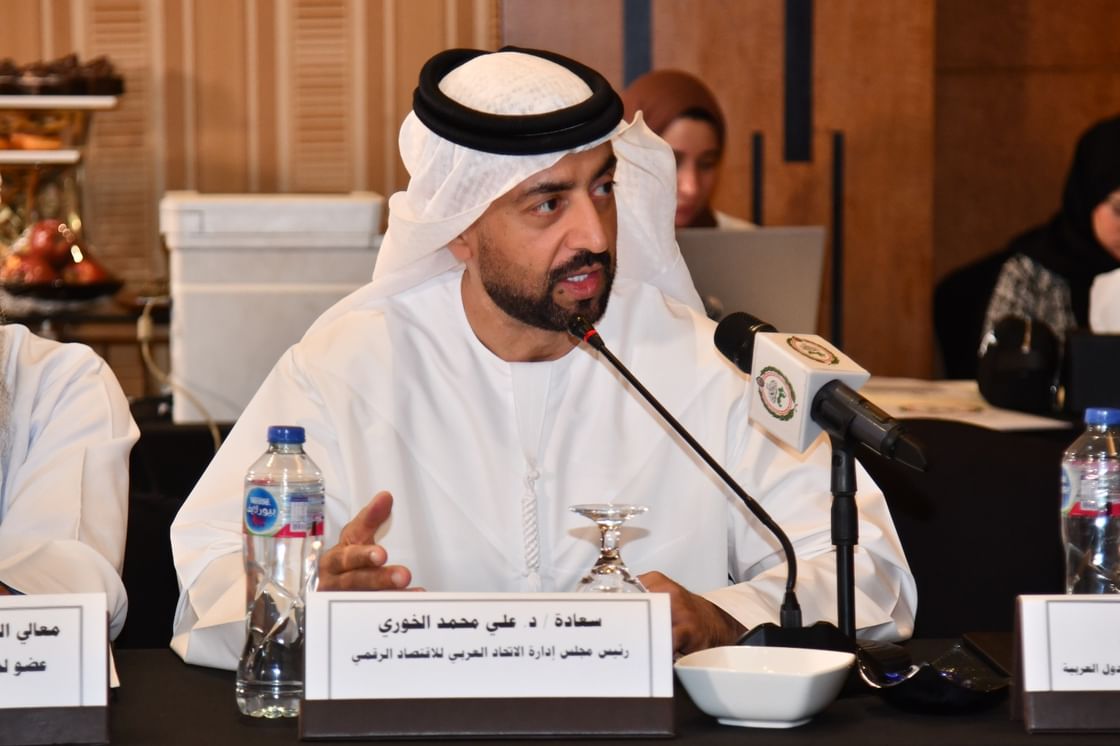Abu Dhabi: Asharq Al-Awsat
December 17, 2018 – Rabi’ al-Thani 9, 1440 AH
The Arab League launched a joint vision for the digital economy as a new means to promote growth and societal stability. This vision is part of plans and methods to enhance inter-Arab cooperation in various fields, with the aim of leveraging the pivotal role of modern technology in the development of countries and their economies.
The vision was announced during the activities of the First Arab Digital Economy Conference, which kicked off yesterday in the UAE capital, Abu Dhabi, under the patronage of Sheikh Mohammed bin Zayed Al Nahyan, Crown Prince of Abu Dhabi and Deputy Supreme Commander of the Armed Forces, and in the presence of Lieutenant General Sheikh Saif bin Zayed Al Nahyan, Deputy Prime Minister and Minister of Interior.
In his speech, Ahmed Aboul Gheit, Secretary-General of the Arab League, emphasized that Arab countries are working to enhance inter-Arab cooperation in all fields, most notably economics, and has initially established the idea of a joint Arab vision for the digital economy as an additional means to promote growth and societal stability. He stated that the selection of the “Arab Digital Economy” as the theme for the conference truly reflects the awareness of the magnitude of the challenges facing the Arab region, given the pivotal role of modern technology in the development of societies and economies in general. He added that the League of Arab States always strives to keep pace with developments taking place around it in all fields and sectors and to adopt best practices to activate and enhance the performance of the joint Arab action system. In this context, it is worth noting the partnership between the League of Arab States and the United Nations Economic and Social Commission for Western Asia within the framework of the Internet Governance Roadmap Initiative, regionally and internationally, making the Arab group among the first regional groups working to formulate a roadmap for Internet governance at the regional level. Aboul Gheit pointed to the significant developments taking place in some Arab countries, as some Arab countries occupy an advanced position among the countries of the world in terms of internet use, in light of the increase in the rate of cross-border data flow linking the Arab region to the rest of the world over the past decade by more than 150 times. In this area, several Arab countries have achieved a significant leap in the digital consumption sector, in terms of increased rates of reliance on smartphones and the use of social media. He expressed his hope that the conference’s outcomes would be a priority and a focus of attention for the Arab League, with its various bodies, contributing to the official Arab dimension and momentum of this major effort.
For his part, Dr. Ali Al-Khouri, Advisor to the Council of Arab Economic Unity, Chairman of the Arab Federation for Digital Economy, and Chairman of the Conference Organizing Committee, emphasized “the importance of the conference in highlighting the perspective from which countries must reconsider their approach to the new frameworks of global economies to develop their systems and operating mechanisms, as traditional methods and tools for development no longer—and will never—lead to achieving sustainable economies at the required level and pace.”
He said, “The Arab region today faces a great opportunity through activating joint Arab action, which can create tremendous job opportunities, develop skills, attract investment and capital, support its markets, pave the way for self-sufficiency, and contribute to knowledge production, a vast productive network estimated at 450 million people, the size of its natural resources.” The conference comprises sessions attended by representatives of several international organizations to discuss the components of the digital economy. The first session, “A Shared Outlook for the Arab Region,” featured Vincenzo Aquaro, Head of the Division for Public Institutions and Digital Government at the United Nations; Engineer Atef Helmy, former Egyptian Minister of Communications and Information Technology; and Peter Dery, Minister and Digital Policy Advisor to the European Federation Delegation. The second session discussed global challenges and the need to work within shared agendas, with Stefano Manservese, Director-General for International Development at the European Commission; Major General Gert-Johannes Hagemann, Deputy Commander of the NATO Rapid Reaction Corps; and Tarek Amer, Governor of the Central Bank of Egypt. Professor David Ives, Director of Digital Governance at Harvard University, delivered a recorded message on the importance of a shared Arab vision for the digital economy. The first day of the conference addressed the new agenda for the education and labor sectors in the light of artificial intelligence, with the participation of Professor Gregory Curtin, Member of the Global Advisory Council on the Future of Urban Development and Services at the World Economic Forum; and Morten Meyerhoff from the United Nations University. Siim Skøt, Chief Information Officer of the Government of Estonia, participated in the fourth session on emerging technologies in the Arab region and how to frame and enhance them in terms of legislation and technological infrastructure. The first day of the conference concluded with a review of lifestyles in the digital society and smart cities, with the participation of Dr. Khaled Al-Salami, Director General of the e-Government Unit and focal point for the Open Government Partnership Program for the Prime Minister of Tunisia, and João Vasconciales, Digital Government Policy Analyst at the Organization for Economic Co-operation and Development. The recommendations of the first Arab Digital Economy Conference are planned to be presented to Arab leaders after the conclusion of the second day’s proceedings at the Arab Summit scheduled to be held in Tunisia in March 2019.










